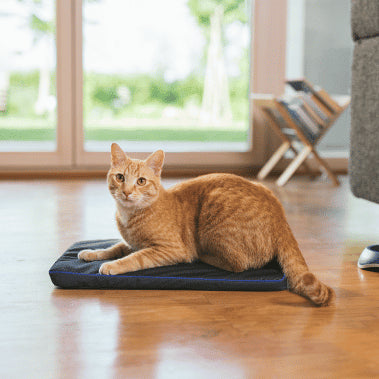
Bone and Joint Support for Pet
If your pet is dealing with joint-related health conditions, the best way we can do is to reduce joint inflammation, strengthen joints, and relieve pain. Dr. Ruth Roberts create specialized Support Protocols tailored to pets grappling with Bone and Joint Issues.
These supplements are meticulously crafted from whole-food sources, ensuring they facilitate the gentle, secure, and healthful elimination of toxins from your pet's system. This holistic approach prioritizes your pet's well-being, offering comprehensive support for their bone and joint health.
-
EASE - Full Spectrum Oil For Dogs with Joint Issues and Inflammation
(42)Regular price $87.99 USDRegular priceUnit price per$0.00 USDSale price $87.99 USDFull Spectrum Oil for Dogs with Arthritis and Aches Give your dog the healthy and active lifestyle it deserves with Full Spectrum Dog Health’s EASE. This organic, full spectrum hemp extract formula targets inflammation and naturally balances your dog’s immune system. EASE delivers a holistic solution to everyday allergies, arthritis, and aches and pains with a combination of high quality natural ingredients selected to promote healthy joints and greater mobility. EASE Full Spectrum Oil Hea...
-
PetsPEMF Pad - PEMF Mat for Dogs and Cats
(42)Regular price $399.00 USDRegular priceUnit price perThe Best PEMF Mat for Dogs & Cats! Introducing the PetsPEMF Pad – the ultimate game-changer for your furry friends. This PEMF mat for dogs and cats is designed to support your dogs or cats mobility and comfort, especially suitable for pet with joint pain and arthritis. PEMF Pad Key Benefits: Non-invasive Pain Relief Reduced Swelling Improved Joint Health Accelerated Post-Surgery Recovery What is PEMF Therapy? PEMF therapy involves sending magnetic energy into the body. It syncs u...
-
Omega Pawz - Liquid Fish Oil Supplement for Pet’s Energy Booster
(42)Regular price $37.82 USDRegular priceUnit price perBoost your pet's energy and overall health with Omega Pawz by Dr.Ruth Roberts. Our premium fish oil supplement is packed with omega-3 fatty acids, EPA, and DHA to promote healthy skin, coat, and joint function, improved memory, cardiovascular health and more! Our liquid formula is easy to administer - simply add a few drops to your pet's food or water each day. Unlike many fish oil supplements, Omega Pawz is made with pure, high-quality fish oil and is free from artificial additives and prese...
-
MegaSporeBiotic™ - The Best Gut Health Supplements for Pets
(42)Regular price $72.00 USDRegular priceUnit price perMegaSporeBiotic™ is the best solution for pet owners looking to improve their pet’s gut health. This powerful spore-based probiotic supplement is specially formulated to target bloating, diarrhea, and other digestive issues. Featuring a unique blend of 5 Bacillus spores, MegaSporeBiotic™ helps to restore the balance of beneficial bacteria in the gut, supporting healthy digestion and immune function. In addition to its digestive benefits, MegaSporeBiotic™ can also help reduce inflammation and ...
-
The Complete CrockPET Diet Starter Kit - Holistic Cat Food
(42)Regular price $206.84 USDRegular priceUnit price perAre you searching for a solution to ensure your beloved furry feline companion stays healthy and content for many joyful years to come? Look no further than The Complete CrockPET Diet Starter Kit! This Holistic Cat Food kit is designed to give your cat all the essential supplements and vitamins they need for a well-rounded and nutritious diet. With our amazing bonuses and helpful guides, you'll be well on your way to improving your cat's health and wellness. The key to a happy and healthy cat...
-
The Complete Crockpet Diet Refill Kit with Organic Kelp
(42)Regular price $109.84 USDRegular priceUnit price perIf you are ready to change your pet's health for the better, right away, you're in the right place! Our pets' best resource for better health begins right in their bowl with the foods they eat. Feeding your pup the healthiest, safest food on the planet is a huge step in improving their overall health and happiness. What's included in each kit? Each Complete CrockPet Refill Kit includes the following products: Holistic Total Body Support Multivitamin for Cats & Dogs Organic Kelp, Pure P...
-
The Complete CrockPET Diet Kit - Holistic Natural Dog Food
(42)Regular price $206.84 USDRegular priceUnit price perPrioritize your pet's well-being with The Complete CrockPET Diet Kit - Holistic Natural Dog Food. This resource is ideal for pet owners who desire a long, healthy life for their furry companions—offering an ultimate CrockPET Diet® that is formulated by dr Ruth Roberts and packed with all the nutrients your dog. By utilizing The Original CrockPET Diet® and the kit's supplements, you can provide your pet with delectable and nutritionally adequate meals. When you purchase this starter kit, you'l...
-
The Original Crockpet Diet™ Recipes Course
(42)Regular price $49.00 USDRegular priceUnit price per$97.00 USDSale price $49.00 USDUnleash the Chef in You for a Healthier, Happier Pet Are you tired of commercial pet food options that leave you guessing about what's really in your fur baby's bowl? Take control of your pet's nutrition with our comprehensive self-paced course! What You'll Learn🌟 TOCPD Cooking Essentials: Master the art of crafting balanced, nutritious homemade meals for your pets. Discover rotation diet templates tailored for both cats and dogs, ensuring a well-rounded diet. 🐶 TOCPD For Dogs: From succule...
Sale
Bone and Joint Issues in Pet
Our furry companions rely on their bones and joints for every leap, run, and playful romp. When these vital components face health challenges, it can significantly impact their quality of life. Let's learn the causes, common symptoms, and ways to provide relief and support for bone and joint issues in cats and dogs.
Causes of Bone and Joint Issues
🐶 Age and Wear and Tear
As pets age, their bones and joints naturally experience wear and tear. This can lead to conditions like arthritis and degenerative joint disease.
🐶 Genetics
Certain breeds are predisposed to specific bone and joint conditions. For example, larger breeds are more prone to hip dysplasia, while smaller breeds may face luxating patella issues.
🐶 Injuries
Traumatic incidents, such as fractures, dislocations, or ligament tears, can result in lasting bone and joint problems.
🐶 Obesity
Excess weight puts added strain on bones and joints, potentially leading to various musculoskeletal issues.
🐶Nutritional Deficiencies
Inadequate nutrition, especially during crucial growth stages, can impair bone development and joint health.
Common Symptoms of Bone and Joint Issues
🐱 Limping or Favoring a Limb
Pets may exhibit a noticeable change in gait, often favoring one limb or showing signs of discomfort.
🐱 Stiffness
Difficulty in moving, particularly after periods of rest, is a classic sign of joint problems.
🐱 Decreased Activity Levels
Pets with bone and joint issues may become less active or avoid activities they once enjoyed.
🐱 Pain or Sensitivity to Touch
Pets may display signs of pain, which can include vocalizing, flinching, or becoming irritable when touched in certain areas.
🐱 Muscle Atrophy
Weakness or wasting of muscles around affected joints may become apparent.
Relief and Support for Bone and Joint Issues
✅ Weight Management
Maintaining a healthy weight through balanced nutrition and regular exercise can reduce stress on bones and joints.
✅ Supplements
Glucosamine, chondroitin, and Omega-3 fatty acids can help support joint health and reduce inflammation.
✅ Low-Impact Exercise
Activities like swimming or gentle walks can help maintain mobility without putting excessive strain on joints.
✅ Warmth and Comfort
Providing warm bedding and avoiding cold, hard surfaces can alleviate discomfort.
✅ Medical Treatment
Consult a veterinarian for a tailored treatment plan, which may include pain relief medication, physical therapy, or surgical intervention.
✅ Holistic Approaches
Acupuncture, massage therapy, and alternative treatments may offer additional relief for some pets.




















